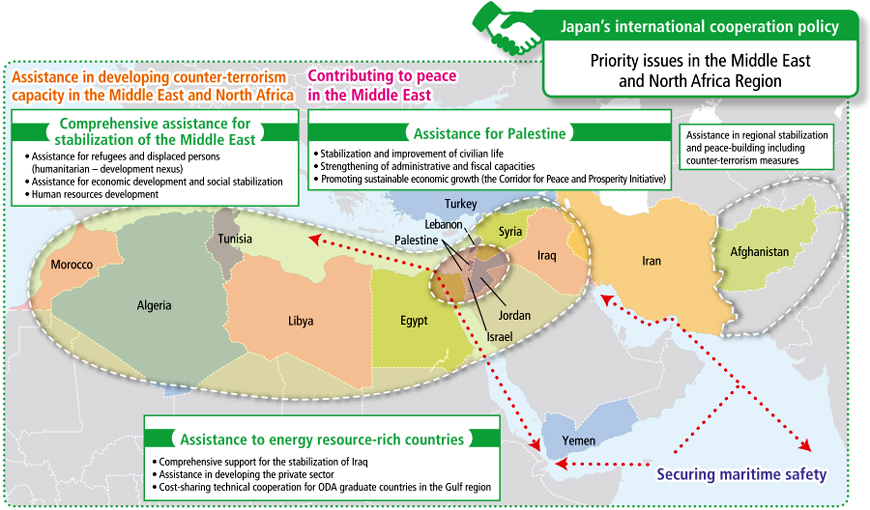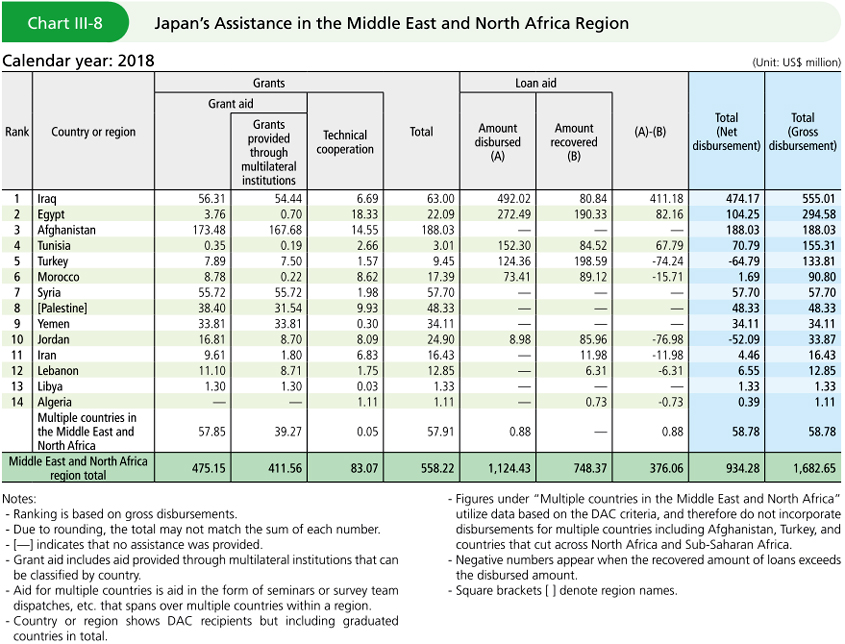7 Middle East and North Africa
The Middle East and North Africa region is a major supplier of energy resources, and accounts for approximately 50% of the world’s oil and natural gas reserves. Japan depends on the Middle East for approximately 90% of its crude oil imports, and the region, as a key point for global distribution, is critically important from the perspective of Japan’s economy and energy security. It is also well recognized as a growing region with a high potential, due to its high rate of population increase, resulting in the expansion of the youth population.
On the other hand, this region is facing various issues that may destabilize the situation. In addition to the historical issues of the Middle East Peace Process that date back to the foundation of Israel in 1948, political turmoil has persisted in various areas since “the Arab Spring” that began in 2011. In particular, civil war in Syria has been continuing and brought about a large number of refugees and internally displaced persons, seriously affecting the stability of the neighboring countries and the entire region at large. Violent extremism exemplified by the Islamic State of Iraq and the Levant (ISIL) still maintains its presence in some areas. Furthermore, conditions in the region are becoming increasingly complex, including the situation concerning Iran, tension among the Gulf countries, and the unstable domestic situations in countries such as Afghanistan, Yemen, and Libya.
Realizing peace and stability in this region is extremely important for Japan as well as the international community as a whole, as it has significant impacts on both regional and global stability and prosperity. There is a need to provide support through such means as economic assistance and human resources development to achieve sustainable peace and stability and to encourage the process of state-building and reconstruction of the states in the region.
Jordan
Project for the Construction of the Petra Museum
Cultural Grant Assistance (March 2014 - April 2019) / Technical Cooperation Project (November 2015 - March 2020)
The UNESCO World Heritage Site of Petra, a huge area of ruins of the ancient Nabataean Kingdom* city surrounded by rocky mountains and also known as a filming location for the movie “Indiana Jones and the Last Crusade,” is the largest tourist destination in Jordan with approximately 800,000 people visiting each year. However, it faces numerous challenges. For instance, local residents were not familiar with the history or lives of the ancient people. The systems for preserving and managing archaeologically valuable relics excavated from the ruins were insufficient, and the opportunities to exhibit them were also limited.
Japan decided to build a new museum adjacent to the entrance to the Petra ruins through the Cultural Grant Assistance in order to improve the situation, stimulate tourism in the Petra region, and promote the development of the local community. Japan has also provided assistance for the museum’s opening through the “Project for Community-based Regional Tourism Development in Petra Region.” This is a JICA Technical Cooperation Project aimed at the development of human resources to run the museum and take on the comprehensive development of the Petra area.
In April 2019, the Petra Museum opened with the attendance of Crown Prince Hussein. Currently, approximately 300 relics from the Stone Age are displayed in the museum, and 6 video clips and 22 touch panels produced through Japanese technical cooperation provide visitors with various information. These have resulted in allowing not only visiting tourists but also local residents and students to learn about the history and nature of Petra, as well as the people that lived in the era of the Nabataean Kingdom. The Petra Museum is expected to contribute to the promotion of tourism—one of Jordan’s main industries—and become a center for educational activities aimed at deepening understanding of the country’s history and culture as well as preserving cultural heritage.
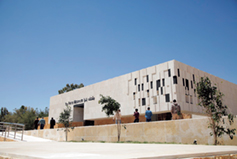
The Petra Museum (Photo: JICA)
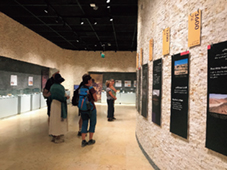
Visitors viewing exhibits inside the Petra Museum (Photo: JICA)
* It is a kingdom of the Nabataeans, which achieved the height of prosperity around 2,000 years ago and flourished through trade particularly in Petra.
●Japan’s Efforts
Support for Syria, Iraq, and the Neighboring Countries
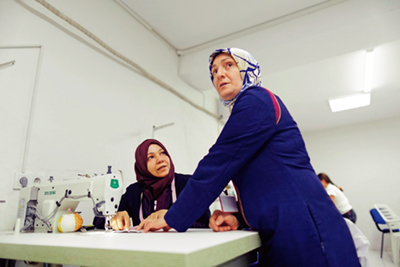
Conducting a course on sewing techniques for Syrian refugees at the women’s center established in Gaziantep City in southeastern Turkey through assistance from Japan (Photo: UN Women Turkey)
With regard to the Syria issue, which is a pressing concern for the international community, Japan announced the provision of assistance at the third Conference on Supporting the Future of Syria and the Region (Brussels Conference) held in Brussels in March 2019, and swiftly carried out the assistance totaling approximately $187 million. This assistance includes support for displaced persons, human resources development of youths, and women’s empowerment. Furthermore, in March 2019, Japan decided to provide assistance of $13 million as support for health, supplies, and medical care for displaced persons in northeast Syria where the situation has rapidly deteriorated as well as for Syrian refugees and the host communities in Lebanon. In December 2019, Japan decided to provide assistance of $14 million for the same kind of support for displaced persons in northeast Syria and their host communities. In 2019, with the aim of improving humanitarian conditions of the citizens and internally displaced persons in the East Aleppo, Japan also provided assistance for the projects of rehabilitating a pediatric hospital that was damaged during combat and early recovery of local community and health and medical services of that area. Since the outbreak of the Syrian crisis in 2011, Japan’s assistance to Syria, Iraq, and the neighboring countries has reached over approximately $2.7 billion. In these ways, Japan provides timely and effective assistance to the region despite the ever-changing humanitarian landscape (See also “(1) Support for Peacebuilding and Refugees/Displaced Persons”).
Japan also provides support for human resources development and the self-reliance of refugees. At the G7 Ise-Shima Summit held in 2016, Japan announced that it would provide comprehensive assistance totaling approximately $6 billion for the Middle East in the three years between 2016 and 2018, including human resources development programs for around 20,000 people, in order to build a “tolerant and stable society” in the region, and has steadily implemented these assistance. As a part of this support, Japan decided to accept up to 150 Syrian students over five years to provide opportunities of education and foster human resources to contribute to Syria’s recovery in the future. In 2019, Japan accepted 22 Syrian students.
Furthermore, as a provision of humanitarian and self-reliant assistance to refugees (including education and vocational training), and assistance to host countries, Japan also provided an assistance package of approximately $2.8 billion over three years, as announced by Prime Minister Abe at the United Nations Summit for Refugees and Migrants held at the United Nations General Assembly in 2016.
Assistance to Afghanistan
Japan has consistently provided assistance to Afghanistan. As one of the major donor countries to Afghanistan, Japan has been endeavoring to coordinate its assistance with the government of Afghanistan and other donors such as the G7, UN organizations, and the World Bank. Additionally, in order to support Afghanistan’s efforts toward self-reliance and stability, Japan prioritizes capacity building of the police force in the security field, as well as agricultural and infrastructure development in the development field. Moreover, Japan places particular importance on the education and health sectors in terms of human resources development.
In 2012, Japan and Afghanistan jointly held the Tokyo Conference on Afghanistan. The conference, attended by representatives of around 80 countries and international organizations, issued an outcome document titled the “Tokyo Declaration.” At the conference, the Tokyo Mutual Accountability Framework (TMAF) was established to clarify the mutual commitment between Afghanistan and the international community for the sustainable development of Afghanistan, and to regularly monitor and review the commitment. This framework of mutual accountability has been succeeded by the Geneva Mutual Accountability Framework (GMAF), adopted in November 2018 at the Ministerial meeting of the Geneva Conference on Afghanistan.
Middle East Peace (Assistance to Palestine)
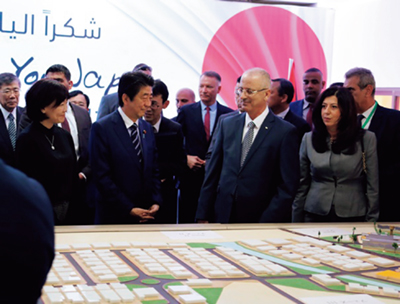
Prime Minister Abe visiting JAIP (May 2018) (Photo: Cabinet Public Relations Office of the Government of Japan)
Japan has positioned its assistance to Palestine as one of the important pillars of its measures to contribute to the Middle East Peace Process, and has provided more than $1.9 billion in assistance to Palestine since the 1993 Oslo Accords. Specifically, Japan provides various types of humanitarian assistance through international organizations and NGOs to improve the severe living conditions of the socially vulnerable people in the West Bank (including East Jerusalem), people affected by conflicts in the Gaza Strip, and others. Japan is also engaged in efforts aimed at preparing for the Palestinian nation-building in the future and for a self-sustained Palestinian economy, in order to stabilize and improve the people’s lives, strengthen the financial foundation, enhance the administrative and financial capacity, and promote economic self-reliance.
Since 2006, Japan has launched the initiative of the “Corridor for Peace and Prosperity” as its unique medium to long-term initiative that aims to promote socioeconomic development in the Jordan Valley area through regional cooperation among Japan, Israel, Palestine, and Jordan, and is implementing the development of the Jericho Agro Industrial Park (JAIP) as the flagship project of the initiative. In May 2018, Prime Minister Abe visited JAIP during his visit to Palestine, and received a briefing on the current conditions from Prime Minister Hamdallah of Palestine. At the same time, he also toured the exhibition booths set up by tenants operating in JAIP (as of March 2019, out of the 37 companies that have concluded tenancy contracts, 15 were in operation).
Furthermore, in 2013, Japan launched a new initiative called the “Conference on Cooperation among East Asian Countries for Palestinian Development (CEAPAD)” to help Palestine achieve economic independence by drawing on Asia’s experience on human resources development and corporate economic development. To date, meetings have been held on triangular cooperation for human resources development (See “South-South cooperation” under glossary) and on trade and investment expansion. Moreover, through these meetings, Japan plays an important role, such as by encouraging more countries to provide support for the United Nations Relief and Works Agency for Palestine Refugees in the Near East (UNRWA), which is responsible for assisting Palestinian refugees. In July 2019, Japan co-hosted the Senior Officials Meeting of CEAPAD with Palestine in Ramallah, Palestine, and the importance of incorporating the private sector’s vitality into the development of Palestine was reaffirmed. In addition, in September 2019, Foreign Minister Motegi attended the Ministerial Meeting on UNRWA held in New York, and stated that Japan would provide a total of approximately $11 million in grant aid to support UNRWA for its assistance in education, sewage treatment, and food supply.
Japan has steadily implemented such assistance, and in cooperation with the international community, will continue to provide support for social stabilization and inclusive growth, not only from the perspective of humanitarian assistance, but also a medium to long-term view. This includes assistance in human resources development that leverages on Japan’s strengths.
